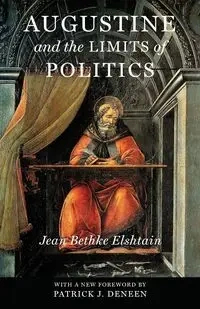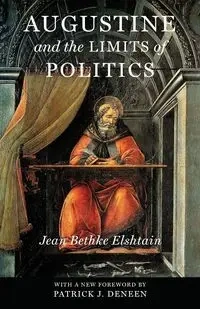Augustine and the Limits of Politics - Jean Elshtain
Augustine and the Limits of Politics - Jean Elshtain
EAN: 9780268020019
Symbol
381FFD03527KS
Autorzy
Jean Elshtain
Rok wydania
1996
Elementy
176
Oprawa
Miekka
Format
14.0x21.6cm
Redakcja
Deneen Patrick J.
Język
angielski

Bez ryzyka
14 dni na łatwy zwrot

Szeroki asortyment
ponad milion pozycji

Niskie ceny i rabaty
nawet do 50% każdego dnia
Niepotwierdzona zakupem
Ocena: /5
Symbol
381FFD03527KS
Kod producenta
9780268020019
Autorzy
Jean Elshtain
Rok wydania
1996
Elementy
176
Oprawa
Miekka
Format
14.0x21.6cm
Redakcja
Deneen Patrick J.
Język
angielski

Jean Bethke Elshtain brings Augustine's thought into the contemporary political arena and presents an Augustine who created a complex moral map that offers space for loyalty, love, and care, as well as a chastened form of civic virtue. The result is a controversial book about one of the world's greatest and most complex thinkers whose thought continues to haunt all of Western political philosophy.
What is our business "within this common mortal life?" Augustine asks and bids us to ask ourselves. What can Augustine possibly have to say about the conditions that characterize our contemporary society and appear to put democracy in crisis? Who is Augustine for us now and what do his words have to do with political theory? These are the underlying questions that animate Jean Bethke Elshtain's fascinating engagement with the thought and work of Augustine, the ancient thinker who gave no political theory per se and refused to offer up a positive utopia. In exploring the questions, Why Augustine, why now? Elshtain brings Augustine's thought into the contemporary political arena and presents an Augustine who created a complex moral map that offers space for loyalty, love, and care, as well as a chastened form of civic virtue. The result is a controversial book about one of the world's greatest and most complex thinkers, one whose thought continues to haunt all of Western political philosophy.
In making Augustine's thought relevant to the contemporary world Elshtain discusses how, for Augustine, wisdom comes from experiencing fully the ambiguity and division that characterized the human condition after the fall, and how human beings are fated to narrate their lives within temporality and to work at gathering together a 'self' and forging a coherent identity. This is the central feature of what Augustine called our business "within this mortal life," and he insisted that any politics that disdains this business, this caring for the quotidian, is a dangerous or misguided or misplaced politics.
Elshtain argues that Augustine's great works display a canny and scrupulous attunement to the here and now and the very real limits therein. She discusses other aspects of Augustine's thought as well, including his insistence that no human city can be modeled on the heavenly city, and further elaborates on Hannah Arendt's deep indebtedness to Augustine's understanding of evil. Elshtain also presents Augustine's arguments against the pridefulness of philosophy, thereby linking him to later currents in modern thought, including Wittgenstein and Freud.
EAN: 9780268020019
EAN: 9780268020019
Niepotwierdzona zakupem
Ocena: /5
Zapytaj o produkt
Niepotwierdzona zakupem
Ocena: /5
Napisz swoją opinię

